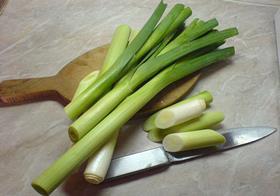
A Lincolnshire farmer has partnered with food charity the Gleaning Network to harvest surplus crops and donate them to local food charities.
A team of volunteers visited J&V Casey and Son's farm near Boston on Saturday (3 May) to harvest and then pack surplus leeks that would otherwise have gone to waste and been ploughed back into the ground.
Around 1,000 kilos of leeks were salvaged - enough for 12,500 portions - and then distributed to regional food and homeless charities.
Tim Casey is one of several farmers around Cambridgeshire and Lincolnshire to have formed a partnership with Gleaning Network UK, alerting the food waste campaign when opportunities come up to save healthy, fresh food for those who most need it.
Casey said: 'Over-production is part and parcel of the fresh produce industry due to increasing volatility in prices, contracts and yields.
'Until now we had no way of utilising our surplus produce. Fortunately this new initiative generated through the Leek Grower's Association, means we have an outlet for produce we would normally just plough back into the soil and it's great to know that local charities and those in need can benefit from it.'
Vicki Beers, Gleaning Network's Cambridgeshire and Lincolnshire co-ordinator, said: 'We had a brilliant day harvesting in glorious weather, supported by passionate volunteers eager to save good, edible food from going to waste.
'This farm has been really helpful - and all the farmers we work with are glad to see their veg go to a good home. It can be very frustrating for growers to see the crops they've tended and invested in going to waste. We are always looking for more farmers, and volunteers, to work with.
'Food wasted at farm level is a huge problem - it wastes resources and has a high carbon footprint, helping to cause climate chaos. In the meantime, millions of people are going hungry in this country. This project tries to find solutions to all these problems together.'
In 2013, Gleaning Network UK gleaned approximately 48 tonnes of produce, equal to over 200,000 meals, with over 200 volunteers across 18 gleaning days. New hubs sprung up in Manchester, Bristol, Brighton, Cambridge, London and Kent, and during 2014, new hubs will be launched in the UK and around Europe.
Apples, pears, plums, strawberries, cauliflower, cabbages, lettuces, pumpkins and parsnips are just some of the produce already gleaned. Produce is donated to charities and social enterprises that deal with food poverty such as FareShare, Company Shop and Community Food Enterprise.






No comments yet